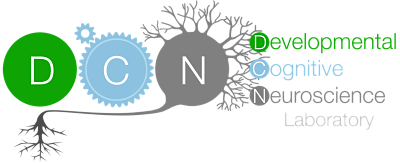Dr. Dima Amso (she/her) is the principal investigator of the DCN lab. In her lab, we are interested in understanding the process of human brain and cognitive development. The amount of learning that takes place in infancy is arguably unmatched at any other point in the human lifetime. This is even as infants are not able to walk, talk, or adroitly manipulate objects. Attention, learning, and memory systems play a critical role in these seismic shifts in neural and cognitive development. In recent years, our lab has made novel discoveries regarding the numerous sophisticated learning systems available to infants. Our plan is to exploit these discoveries to ask innovative questions about (1) how interactive learning systems in infancy offer plasticity in the presence of risk and opportunity, and in doing so (2) how they are simultaneously being shaped by experience for adaptive function in future environments.
In another line of work, we are examining the impact of childhood experiences on executive functions development. Working memory is an executive function that allows for maintenance and manipulation of information and is thus relevant to planning, decision-making, and behavioral regulation. Previous work has suggested that family socioeconomic status (SES) may shape working memory development in early childhood. However, it is unclear whether previous findings reflect true working memory differences as a function of SES, or whether they reflect how working memory is traditionally tested in the laboratory (and by extension the demands placed on working memory in traditional educational contexts). In work recently funded by the National Science Foundation, we are examining the relationship between SES and working memory performance in 4-7 year-old children while we systematically incorporate goal, reward, and choice into passive computerized and active play-based working memory assessments. Expanding our repertoire of working memory tasks will give us a broader window into how experience shapes executive functions, in a way that is less skewed by the fit between laboratory task-demands and children’s experiences.
Our lab is additionally committed to global partnerships. Global crises have increased the number of mass migrations and displacement, and thus children experiencing the effects of profound stress. Jordan houses just over 655,000 Syrian refugees, and almost 40% are children. Of these almost quarter of a million children, approximately 31% are not enrolled in any kind of formal educational program. Their education comes in the form of psychosocial support interventions offered by external international and non- governmental organizations. Our lab has partnered with Taghyeer and the We Love Reading (WLR) program, a local Jordanian reading intervention, to support early childhood development. Reading for pleasure is a positive and culturally-sensitive approach to enriching children’s agency, parent-child interactions, early literacy, and executive functions in preschoolers.
